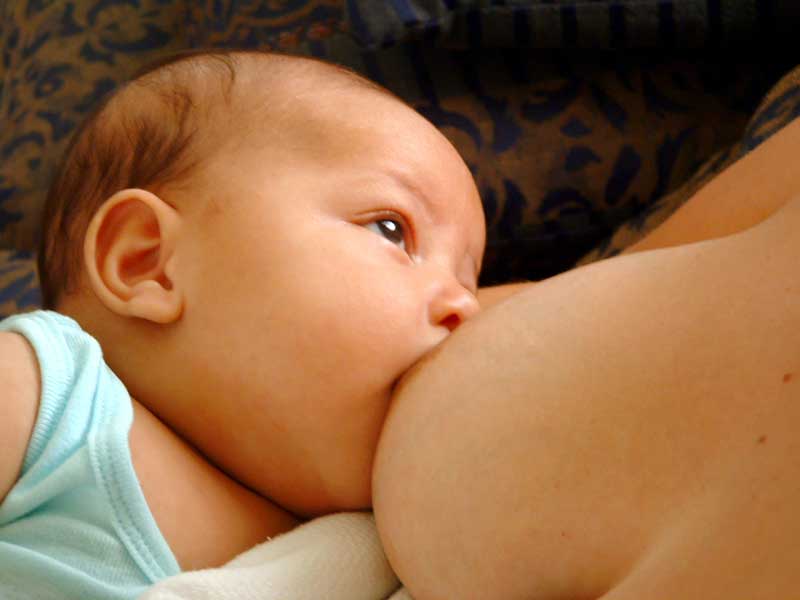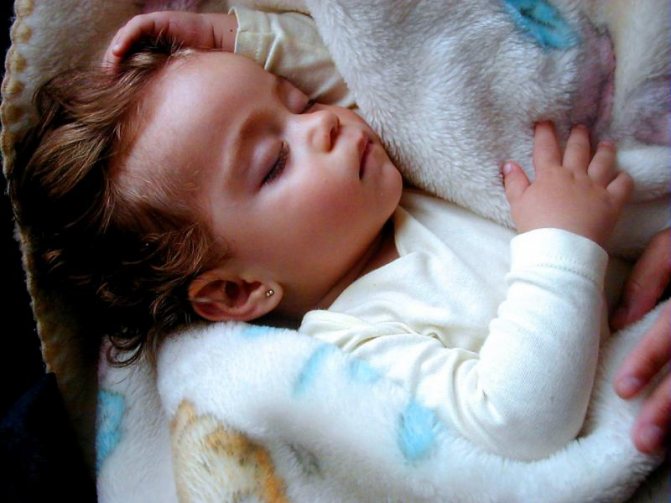Many children become so accustomed to their mother's breast that they do not want to part with it even during daytime or nighttime sleep. For this reason, the mother has many difficulties, which are associated with the fact that she cannot move freely around the apartment and perform all the necessary household chores. It is necessary to wean a baby from this habit gradually and very carefully, otherwise the baby will protest, cry and express his dissatisfaction in every possible way.
Baby sucks mother's milk
If your baby nurses all night
If a child suckles at the breast throughout the night, then in order to rid him of this habit, the mother must first teach the baby to fall asleep at night without a breast. When the baby learns to calmly fall asleep without the breast, the number of nightly attachments should be reduced.
Important! The number of night feedings should be reduced gradually and gently, both for the baby and for the mother. Abrupt separation can result in mental trauma.
To begin with, the mother must help the child change the association with sleep: teach the baby to calm down and relax in other ways, but not by sucking the breast. When the association of sleep with the breast goes away, nighttime attachments will occur much less frequently.
Some babies may wake up to six times a night to nurse. Very often, not because they are hungry, but simply to check the connection with their mother. If during feeding the baby does not swallow milk, then this feeding can be removed. Mom needs to set a goal for herself - not to give the baby the breast until two o'clock in the morning just so that he calms down. When the baby wakes up in the middle of the night, you need to try to calm him down in other ways: rock him in your arms, stroke his head and back, sing a quiet song. The baby's father can also help with motion sickness.
After two o'clock in the morning you can already put the baby to the breast as before. Soon he will no longer wake up during this period of time. Gradually you need to increase the interval to four o’clock in the morning, and then to six. If you can’t calm the baby down, you need to give in and give the breast, otherwise the baby will sense something wrong and become very worried. The mother should remove the nipple from the baby's mouth before he falls asleep again. You need to give him the opportunity to fall asleep on his own.

Feeding at night
Why does the baby “hang” on the chest?

- What does cluster feeding look like?
- Cluster feeding as a way to regulate lactation
- Why do children generally not want to come off the breast?
- How to survive cluster feeding
- How to use cluster feeding to your advantage
The term “cluster feeding” is actively used by lactation consultants, but is not known to everyone, even experienced mothers. In practice, almost everyone has encountered it - these are episodes (hours and even days) when the child literally “hangs” on the chest. The intervals between feedings are so small that it is difficult to understand whether this is still the previous one or the next one? It is these series of feedings that are called “clustered” or grouped.
Why does the baby endlessly suckle at the breast, does he suffer from hunger, should you be alarmed if such a “hang” occurs, and how to survive this period as comfortably as possible for the baby and mother?
Baby uses breast as pacifier
Why does a child constantly suck his thumb? Is this normal?
Babies can breastfeed for both long and short periods of time. The amount of time spent at the breast does not indicate the volume of milk consumed. Also, the baby can suckle at the breast without sucking out milk at all. Very often, a mother can see that the baby slightly sucks (holds in her mouth) the breast while sleeping. In this case, the child sucks rather than drinks. This need in a baby may arise due to stress, an age-related growth spurt, a reaction to the weather, or he simply wants to feel that his mother is nearby all the time.
Reasons why this happens:
- Incorrect attachment to the breast. A child can either lag behind in weight or gain absolutely normally, but it is very difficult for him to suck mother’s milk.
- Disease or developmental features. The baby may constantly ask for the breast due to some neurological disorders, teething or colic. Sucking brings him relief. Also, the baby may ask for the breast more often during colds that are accompanied by high fever. At this moment he will feel bad, scared, and will constantly want to drink.
- The child is stressed. Frequent feeding is a baby’s natural reaction to a stressful situation. There is no need to eliminate all stress from the baby’s life (and this is unrealistic), but it is necessary to give him the opportunity to calm down at his mother’s breast, including through frequent latching.
- Mom is stressed. In stressful situations, the mother's amount of the hormone oxytocin, which has a direct effect on milk production, is reduced. Therefore, it is very difficult for a child to get food from his mother’s breast. The more often and more the mother worries, the more difficult it is for the baby to eat. In such situations, he can actually hang on his chest for whole days.

Constant sucking
Mom feeds

Why doesn't the baby let go of the breast?
Periods when the baby hangs on the chest occur in two- to three-month-old children, and in nine-month-old children, and even in children over a year old. The reasons for this behavior vary and depend on age.
A newborn baby, up to 1 month old, needs frequent and continuous breastfeeding. Usually at this time children are constantly at the breast, but mothers regard this as the natural behavior of a child getting used to a new stage of development. The child fully satisfies the sucking reflex. Mothers do not yet feel tired, they themselves do not yet want to separate from the child, and do not complain that he is constantly hanging on his chest .
Time passes, and the rhythm of feeding gradually improves, mother and baby adapt to each other, mother learns to manage to do her business in between feedings. And suddenly - like a bolt from the blue - at the age of about 3 months, the child begins to demand the breast more often, does not let go of it after he has eaten, and if the mother refuses, he becomes capricious and screams. Mom is in a panic: what to do?
“Experienced” grandmothers admonish: “It’s his character that is showing, don’t pamper him, don’t give him the breast.” Nervous dads echo grandmothers: “Is he the boss here? Let him lie in bed, there is no point in indulging his whims.” Girlfriends advise: “Give him a pacifier, he will scream and calm down, it happened to me too.”
Having respectfully listened to these opinions, confident mothers still follow their own ideas about raising a baby. And here the main thing is to understand why the baby does not let go of the breast? The fact is that at the age of 3 months the first lactation crisis occurs. For many women it goes unnoticed. And for some, the amount of milk decreases slightly. The baby grows rapidly during this period, he needs more and more milk every day. And there is less and less of it in the chest. Feeling this, the child instinctively tries to solve the problem in the only way available to him - by more frequent breastfeeding. The child in this case is wiser than the mother, he does not listen to anyone, he does what nature taught him in the process of evolution: if you suck the breast, there will be food, you will live.
The best way out for a mother is to listen to the child and give him what he asks for. A calm, confident mother knows that the period of “hanging” on the breast is a temporary phenomenon, and if you do not get nervous and do not blame yourself and the child for what is happening, then this period will quickly and safely end, and you will return to your usual feeding rhythm.
If you try to “educate” a three-month-old child, show him who is in charge, admonish him with meaningless lectures like “well, you just ate,” then you can end up in a vicious circle:
The child asks for the breast - the mother does not give - the child is nervous and asks for the breast to calm down - the mother does not give, thinking that he is capricious - the child screams and cries in panic, asks for the breast - the mother, unable to bear it, gives up and gives the breast - the child, having finally received breast, sucks on it for a long time and does not let go - the mother pulls out the breast - the child is nervous again, afraid that they will not give him the breast again - the mother gets irritated with the child, scolds him, does not give the breast, punishing him - the child does not understand what is happening, wants only one thing, to suckle the breast and for everything to be as before - the mother wants only one thing: to rest and sleep - everyone is crying.
Often the way to break this vicious circle is to switch to artificial feeding; it is at 3 months that many mothers stop breastfeeding: the baby begins to hang on the chest, the mother thinks that he is not getting enough, and gives him formula. All.
How to break out of a vicious circle?
A more correct way out of the vicious circle is simple: you need to obey the child’s wishes, postponing your pedagogical aspirations to a later period. Just let your baby hang on your chest as long as he needs. Don't get enough sleep? Arrange for co-sleeping. Don't have time to do household chores? Buy a sling, adapt to it, learn to do household chores without being separated from your child. Tired? Relax with your child. There is a solution for everything, you just need to want to maintain natural feeding! Remember, this is not forever, periods of hanging on the chest usually pass quickly.
Thus, at the age of up to 1 year, periods of hanging on the chest are associated with lactation crises. The older the child, the shorter these periods are, and they may already be associated with some external problems not related to the amount of milk: for example, teething causes some discomfort in the child’s mouth, and he tries to smooth it out with frequent sucking. Colds and ailments of a child can also provoke long periods of hanging on the chest. But this makes it easier for the baby, you can ease his pain by simply giving him the breast at inopportune times when he asks.
If a child is older than a year, is not sick and is not actively cutting teeth, but at the same time he begins to constantly demand the breast (eating regular food in normal quantities) - this may be due to the beginning of weaning. Often mothers of one-year-old children begin to think that it is time to give up breastfeeding. They talk about this a lot, hint to the child that he is “already big,” and try to limit sucking. The child expresses his disagreement and unwillingness to part with the breast precisely by frequent attachments to it. Seeing the mother, the child is distracted from a very interesting toy and runs up to suck on the breast, and then runs off to play again. This is how the child seeks confirmation that the valuable breast belongs to him. A child needs this feeling to gain confidence, control over the world, and trust in the environment. If you feel that the child is older than a year, that he is not yet ready to part with her. If possible, you should continue breastfeeding and wait for the end of this period and a more favorable situation to stop breastfeeding. You can already negotiate with children over one year old, you can calm and encourage them by attaching to the breast, you can sometimes refuse to attach for a short time, showing frustration and resentment if the child displays unwanted behavior. However, you cannot manipulate latching; this is not fair to the child - after all, for him the breast is still associated with unconditional maternal love. “If you don’t eat the porridge, you won’t get titya” - this phrase is understood by the child as follows: “if you don’t eat the porridge, then I will stop loving you” - agree, that’s not what you meant, is it?
So, if the child is hanging on your chest, understand the reasons and tune in to calmly overcome this period, allow the child to stay with you as long as he needs. By doing so, you will strengthen mutual trust and be able to get through this period quickly and painlessly.
To have articles from this blog sent to your email, simply fill out the form:
You can also read on this topic:
Hair loss and breastfeeding
Correct positions for feeding
Treating a baby's throat
How to stop falling asleep while breastfeeding
The baby does not latch on to the breast
How to wean a child from falling asleep with the breast? The main thing that a mother should do is to teach the baby to fall asleep on his own. The baby will still fall asleep with mom's help, but without breastfeeding.
How can you wean your baby from sleeping with the breast? First, you need to try to remove the breast before the baby falls asleep and introduce a new ritual into the process of falling asleep. You can read a fairy tale to your baby, sing a song, recite a poem, or give a light relaxing massage. If after everything the baby still cannot sleep and asks for the breast, then there is no need to force things and it is better to give in. It is important to give the baby the opportunity to get used to such innovations. Over time, the baby will accept a new ritual and will fall asleep only from hearing his mother’s monotonous voice.
If the child falls asleep only with the breast, then you can involve the baby's father or grandmother for a night's sleep. It happens that children fall asleep easier if their mother is not nearby and they cannot attach themselves to her breast.
Learning to fall asleep on your own will take about two to three weeks, but in some cases it may take one month. If progress is already visible, there is no need to force things; it is better to stay at this stage for a few more weeks.

Getting to bed at night
What does cluster feeding look like?
In the first few days after birth, the child eats chaotically: he is unusual, uncomfortable, scared from the novelty of everything that is happening, and the mother’s breast is not only fullness, but also safety, warmth, and the soothing rhythm of the mother’s heart and breathing.
In the second to fourth week after birth, the first “freezing” or cluster feeding most often occurs: the baby sucks at the breast for a long time - the time of one feeding can be up to an hour, then rest a little and start sucking again. So, with short breaks, he can spend up to two days at the breast.
Just when it seems to mom that this endless feeding session will never end, everything suddenly returns to normal and even becomes better than before the crisis. The baby establishes a certain routine, and now we can confidently assume at what time he will be hungry and when he will prefer to take a nap.
Cluster feeding is considered normal if the baby is at the breast without pauses for no more than an hour at a time, and the episode of “continuous” feeding lasts no more than 48 hours. If on the third day the baby does not come off the breast, then most likely you need the help of a specialist - a pediatrician who is friendly to breastfeeding or a breastfeeding consultant.
The second episode of cluster feeding occurs around three months of age and proceeds in a similar manner. This is the most common, but not the only scenario for the development of a baby.
There are children in whom episodes of such cluster feedings occur regularly, and against the background of good health and normal development, without delays (the desire of a sick child to find relief and consolation at the mother’s breast is understandable, we will talk about it later). And there are babies who, from birth, pamper their mothers with a lack of food whims. What does this depend on?
When to wean
Child bites breast
The earliest age a child can be weaned is 6 months. It is best to do this no earlier than 9-10 months, when the baby has an alternative diet and does not completely depend on breast milk.
You can try gradual separation of breastfeeding and sleep only under certain conditions:
- The baby is somatically healthy, is gaining weight well and behaves absolutely calmly;
- The baby eats complementary foods (porridge, vegetable and fruit purees, fermented milk products) without any problems;
- The baby is already 9-12 months old;
- The child has his own crib and is not used to sleeping in the same bed with mom and dad.

Mom next to her sleeping baby
Cluster feeding as a way to regulate lactation
In general, cluster or combined feedings are a natural phenomenon, and not an indicator of pathology in the development of a child, and certainly not an indicator of a lack of breast milk. Rather, it is a means of regulating its quantity - specialists in the care of newborns have noticed that such restless behavior occurs in babies at the beginning of periods of spasmodic growth and weight gain. By spending the whole evening at the breast, the baby thereby stimulates an increase in lactation, which means it provides itself with food for the coming period.
Why don't all children behave the same? Most likely, the matter is in the mother's milk production; if its quantity was initially somewhat excessive for a particular baby, then he does not seek to stimulate lactation with additional feedings, thereby reducing the intensity of lactation to the optimal level.
On the contrary, a mother whose breasts do not accumulate a lot of milk will have to feed more often and go through cluster feedings every month.
I would like to emphasize that all this fits into the norm if the child is calm, does not show any signs of ill health, and leaves at least a dozen wet diapers per day.
How to do it gradually
There are several ways. A long way that requires patience is feeding half an hour before bedtime:
- Prepare the child for bed in advance: bathe, change clothes;
- Let the breastfeed for no more than 15 minutes. The child must be fed;
- Free the baby's mouth from the nipple before he falls asleep;
- Talk a little with the baby, play quiet games, read a book;
- After half an hour, put the baby in the crib and stay close until he falls asleep. To calm him down, you can offer him a pacifier.
Teaching a baby to sleep without a breast is much easier if his dad puts him to sleep and the baby does not smell the milk. The father must take over the mother's responsibility every day for 5-7 days.
Dad's help will look like this:
- Mom will feed the baby half an hour before bedtime and leave the room;
- Dad needs to prepare the baby for bed: buy, change clothes;
- Take the baby to the nursery and put him in his crib;
- Sit nearby, read books, sing a lullaby or sleep with a baby in your arms;
- You need to react calmly to screams and hysteria. You can let your baby drink water from a bottle or offer a pacifier.
You can also come up with a new ritual. For example, it could be like this:
- The child ate well before bed: sucked the breast, drank kefir, ate cottage cheese;
- His mother put him to bed;
- Mom turns on the night light and sits down next to her on the crib;
- Then he gently strokes the baby’s back and sings a lullaby;
- When the baby falls asleep on his own, without breastfeeding, you need to gradually stop feeding him at night. You can replace the breast with a bottle of water.
Note! The actions for the evening ritual will depend on the baby’s temperament and preferences. In addition to reading fairy tales, you can use massage and rocking in the cradle.
How to survive cluster feeding
Not all mothers like the fact that the baby constantly sucks at the breast throughout the day - indeed, it can be tiring. What can you do to survive cluster feeding calmly and even with pleasure?
Do not be nervous!
You are doing everything right, your child is not sick or suffering from nutritional deficiencies. Everything that happens to you is a normal situation in the formation of lactation.
Calm the baby
Loose swaddling (an older child can be tightly wrapped in a light blanket), rocking, lullabies, “white noise”... Remove bright lights and loud sounds. All this calms and puts the baby to sleep, allowing you to take a break.
Eat and sleep
Try to have food in the freely accessible area (preferably healthy - not fatty, not spicy, not soda or fast food). Snack while feeding your baby!
If the child dozes off, immediately go to bed to rest. This kind of interrupted sleep may not allow you to truly rest, but it is much better than no sleep at all.
Have fun!
Look at cluster feeding periods as a forced vacation. Stock up on your favorite TV shows, books, magazines - when else will you have the opportunity to spend a couple of days watching TV without remorse?
Take a walk
If you use a sling, don’t sit at home, go for a walk! In summer, you can go to a quiet park with a stroller - just don’t forget to take a light shawl with you to cover your chest and feed your baby during the walk.
Ask your loved ones for support
Explain to your loved ones and husband that a cluster feeding episode is a normal stage in a child’s life when it is necessary to increase the amount of milk before the next growth spurt. Ask them for help in everyday matters.
What not to do
When teaching your baby to fall asleep during feeding, you need to be patient. It is not possible to change a baby’s habit in one day. On this path you cannot do the following:
- Wean a newborn from the breast when he is unwell, has a fever, is teething, or is experiencing some kind of stress (mom going to work, moving, going to kindergarten).
- Wean the breast abruptly, unexpectedly, and leave the baby to fall asleep alone in the room.
- Ignore crying, screaming, hysterics. Leaving the baby to fall asleep alone, letting him scream so hard that he falls asleep from exhaustion. This is a big psychological trauma for a little one.
- Use mustard and red pepper to lubricate the breasts, trying to wean off breastfeeding. In this case, the child is provided with a taste shock and a burn of the mucous membrane.
If you don't wean
The older the baby, the easier it is to wean him from sleeping under the breast, because with age he becomes more and more prepared for the fact that he can live separately from his mother, calm down in other ways and eat not only mother’s milk.
Learning to fall asleep independently at six and two months are tasks with very different levels of complexity. In the first case, this is, although mild, violence against a small person. In the second - the natural process of his growing up and separation from his mother.
In all matters relating to breastfeeding and raising a child, you should rely on your own feelings and recommendations of a consultant.










